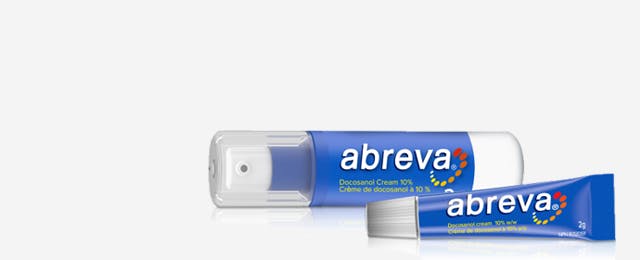HOW TO USE ABREVA
Find answers to frequently asked questions about Abreva: cold sore treatment instructions and more.
-
How should I apply Abreva Cream?
-
How often can I reapply Abreva Cream?
-
How thin or thick of a coating of Abreva Cream should I apply?
-
Who can and cannot use Abreva Cream?
Abreva Cream can be used by adults and children 12 years and older. It should be used five times a day until the lesion is healed for up to 10 days. And because cold sores are contagious, you won’t want to share your tube of Abreva Cream with others. Doing so may spread the infection. Abreva is not recommended for use during pregnancy or while breast feeding unless advised by a physician.
-
Can I use Abreva Cream longer than 10 days?
No, it is not recommended to use Abreva Cream longer than 10 days. Also, it could be the sign of a more serious infection. You should contact your doctor if your cold sore has not healed within 10 days while using Abreva Cream. Having a doctor look at it will ensure that you receive an updated diagnosis and possibly additional treatment.
-
Can I apply cosmetics on top of Abreva Cream?
-
Your label warning says to get medical help if Abreva Cream is swallowed. What happens if I lick my lips and swallow some of the cream? Will this harm me?
-
Can I kiss someone while a cold sore is on my lips?
Since cold sores are contagious, kissing should be avoided during a cold sore outbreak. Getting up close and personal spreads cold sores. At any stage of an outbreak, when you kiss your loved ones, especially on the mouth, you’re very likely to pass on the virus. And remember, though not as common, cold sores can spread to other parts of the body too.
-
What can I expect to happen if I get some Abreva Cream on the skin around the sore?
-
Why can’t I apply Abreva Cream inside my mouth or nose?
-
What happens if some Abreva Cream gets in my mouth?
-
What are the common cold sore triggers?
Some of the most common factors that may trigger a cold sore include fatigue, stress, fever, a cold or the flu all of which can weaken your immune system making you easy prey for a cold sore outbreak. Cold weather, dry air, winter wind and UV rays can also lead to cold sores by drying out lips and damaging your skin. Lastly, the stress associated with hormonal changes and trauma from dental procedures can also cause cold sores.




